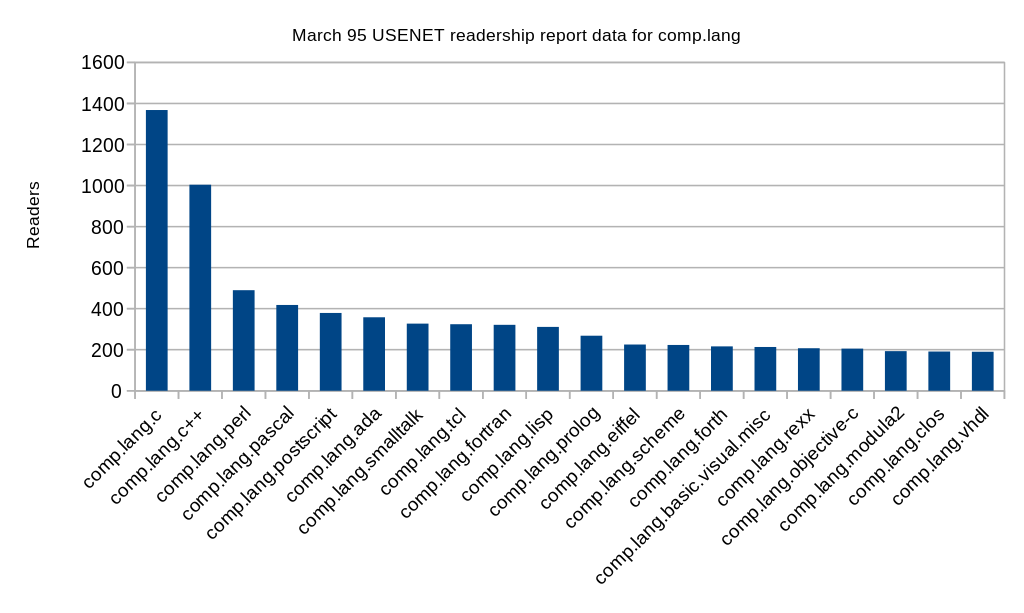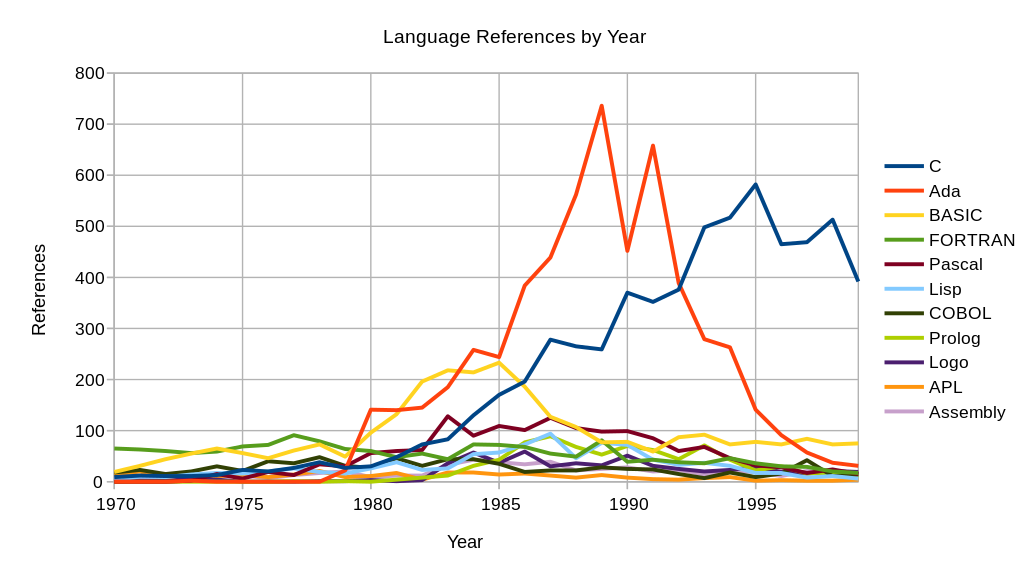Besides the TIOBE Index, which ranks programming language popularity by search engine hits and seems to have data reaching back to the year 2001, are there other sources with some form of measure for the popularity of programming languages in the last millennium?
-
2FWIW, the "Very Long Term History" section on that page has some information going back to 1989. (C, C++, and LISP were apparently the big three.) So that site may have information that they're not presenting in detail.– faddenCommented Jun 8, 2019 at 20:23
-
Define 'popularity'– Bruce AbbottCommented Jun 10, 2019 at 2:14
-
Asking 'for some form of measure' I meant to keep this as general as possible knowing how vague the term 'popularity' is but also how hard it might be to find any pre-WWW data at all: number of usenet questions, number of scientific articles stating a language being used... I have added an answer based on a search for number of library items: many books about Pascal and BASIC being published in the 80s 'rhymes' with my memory of these languages being very popular among hobby programmers at that time.– v-joeCommented Jun 11, 2019 at 1:37
-
1I wonder if maybe Dr. Dobb's Journal might have done some surveys back in the day?– LAKCommented Jun 13, 2019 at 14:46
2 Answers
Below is an attempt of ranking 'popularity' of programming languages invented in the 1980s or earlier by searching for "language programming" on worldcat. The table lists how many library items exist per year. C and C++, e.g., can unfortunately not be distinguished in this search, and there are also false positives, considering that C's first release year is 1972.
1970 1972 1974 1976 1978 1980 1982 1984 1986 1988 1990 1992 1994 1996 1998
Ada 0 0 0 2 0 0 0 0 0 22 141 140 145 185 258 244 384 439 562 736 452 658 389 279 263 141 91 57 37 31
Algol 16 15 16 11 9 13 17 19 13 11 7 12 2 9 4 2 4 0 1 0 1 0 0 0 0 1 0 1 0 0
APL 13 20 4 13 11 13 9 14 21 9 11 17 4 18 18 14 16 12 8 13 8 5 4 7 9 2 3 2 2 4
Assembly 9 4 6 3 11 12 7 13 17 20 9 12 12 33 43 38 34 39 22 25 28 20 23 14 21 19 11 21 17 19
AWK 0 0 0 0 0 0 0 0 0 0 0 0 0 0 0 0 1 2 5 8 3 5 7 3 3 5 9 7 4 5
BASIC 19 31 44 55 65 56 46 61 73 49 96 132 196 218 214 233 186 127 107 77 78 59 87 92 73 78 73 84 73 75
BCPL 0 0 1 1 2 1 1 1 5 2 1 1 0 1 0 0 0 0 0 0 0 0 1 0 0 0 0 0 0 0
Caml 0 0 0 0 0 0 0 0 0 0 0 0 0 0 0 0 0 0 0 0 0 0 0 2 1 1 0 0 1 2
COBOL 18 23 15 20 30 21 40 36 48 31 27 46 31 44 44 35 19 22 22 28 25 24 15 7 18 9 16 42 11 14
COMAL 0 0 0 0 0 0 0 1 0 0 0 0 0 0 0 0 0 0 1 1 0 0 0 0 0 0 0 0 0 0
C 9 12 11 11 13 23 20 27 38 27 30 48 73 83 130 170 196 278 265 259 370 352 376 498 517 582 465 469 513 392
dBase 0 0 0 0 0 0 0 0 0 0 0 0 0 0 1 2 3 2 4 3 2 2 4 2 3 4 2 0 1 0
Eiffel 0 0 0 0 0 0 0 0 0 0 0 0 0 0 0 0 0 3 2 1 2 1 4 4 5 4 7 1 2 1
Forth 0 0 0 1 0 0 0 1 0 0 1 2 8 12 11 11 12 13 3 9 7 5 2 2 8 1 1 0 2 2
FORTRAN 65 63 60 56 59 69 72 91 79 64 60 48 55 44 73 72 68 55 49 81 39 43 38 36 46 36 30 29 20 17
FoxPro 0 0 0 0 0 0 0 0 0 0 0 0 0 0 0 0 0 0 0 0 2 1 3 3 1 3 2 3 1 1
Lisp 3 10 9 14 17 16 20 26 19 16 26 38 23 26 54 57 73 94 46 76 72 43 33 37 31 17 17 8 11 6
Logo 0 2 2 5 4 0 0 0 1 1 3 1 3 36 57 37 59 30 36 32 51 31 25 20 23 29 19 16 21 19
MIMIC 1 0 2 1 5 0 0 0 0 0 0 2 0 0 0 0 0 0 0 0 0 0 0 0 0 0 0 0 0 0
ML 0 0 0 0 0 0 0 0 0 0 0 0 0 0 0 1 0 1 0 0 1 2 7 9 14 1 9 10 11 16
Modula-2 0 0 0 0 0 0 0 0 0 0 0 0 5 5 3 14 12 13 9 12 9 8 3 1 9 1 0 0 0 0
Modula-3 0 0 0 0 0 0 0 0 0 0 0 0 0 0 0 0 0 0 0 0 1 0 1 0 1 1 2 0 1 0
Oberon 0 0 0 0 0 0 0 0 0 0 0 0 0 0 0 0 0 0 0 5 8 5 1 5 6 3 4 2 2 0
Occam 0 0 0 0 0 0 0 0 0 0 0 0 0 2 11 6 11 20 35 19 19 19 13 15 11 8 8 2 4 5
Pascal 0 0 0 2 15 6 19 13 34 30 56 60 62 128 90 109 101 125 105 98 99 85 60 68 46 32 28 17 24 15
Perl 0 0 0 0 0 0 0 0 0 0 0 0 0 0 0 0 0 0 0 0 0 0 1 4 0 3 9 14 30 37
PL-11 0 0 0 0 1 0 1 0 1 0 0 0 0 0 0 0 0 0 0 0 0 0 0 0 0 0 0 0 0 0
PL/C 0 0 0 2 4 0 1 0 1 0 2 0 1 0 1 1 0 0 0 0 0 0 0 0 0 0 0 0 0 0
PL/I 7 17 16 16 15 9 7 10 15 8 5 6 13 3 3 6 2 2 2 0 1 2 0 0 2 1 0 1 1 0
Postscript 0 0 0 0 0 0 0 0 0 0 0 0 0 0 0 0 0 2 9 0 6 5 3 0 0 1 1 1 0 1
Prolog 0 0 0 0 0 0 0 1 0 1 0 4 8 12 31 43 77 89 68 53 70 62 44 71 43 22 30 16 17 9
REXX 0 0 0 0 0 0 0 0 0 0 0 0 0 0 0 3 1 0 1 0 4 1 3 5 5 3 2 2 2 0
Scheme 0 0 0 0 0 2 0 0 2 0 0 0 0 0 4 3 4 4 2 2 10 16 5 2 6 6 11 8 4 6
sed 0 0 0 0 0 0 0 0 0 0 0 0 0 0 0 0 0 0 0 0 0 0 0 0 0 0 0 2 0 0
Simula 0 0 0 0 3 6 3 2 2 9 14 3 4 0 0 0 0 1 3 0 0 0 0 0 2 0 0 1 0 0
Smalltalk 0 0 0 0 0 1 0 3 0 0 0 0 2 2 4 6 3 8 4 8 6 12 5 14 20 19 11 6 9 12
tcl 0 0 0 0 0 0 0 0 0 0 0 0 0 0 0 0 0 0 0 0 0 0 0 0 0 1 3 1 2 2
Graphing the top-eleven languages (by overall publications) per year gives:
-
3Added a graph of the top-eleven languages by year... hope that's OK. Commented Jun 10, 2019 at 10:13
-
1The graph does add a nice overview. I'm surprised about
Adahaving such a high publication count.– v-joeCommented Jun 10, 2019 at 10:24 -
2Very interesting. I see you have FoxPro in the list, but that didn't exist until 1994 (it was called 'FoxBase' before that). 'dBase' or 'xBase' might be worth including, though.– LAKCommented Jun 10, 2019 at 19:44
-
2@MichaelShopsin "Assembler" might show more/better results: one might generically talk of "assembly language" but I have a feeling (from memory only) that books (especially processor-specific ones) might be more along the lines of "Programming in Z80 Assembler" etc. Commented Jun 10, 2019 at 20:01
-
3A bit of searching on Ada suggests the count is dominated by multiple publications of draft and final standards. For example identical reference documents are listed several time as being published by the standards committee, the US DOD, and a commercial publisher with multiple editions for the USA, Europe, etc. Disentangling all this and getting "better quality" data is a job for a professional librarian, I suspect. Commented Jun 11, 2019 at 12:30
While only limited to one month of data and to only one provider, here is a ranking of the top 20 programming languages by number of readers of newsgroups under comp.lang from March 1995 as collected by DEC Network Systems Laboratory (data taken from this link):

